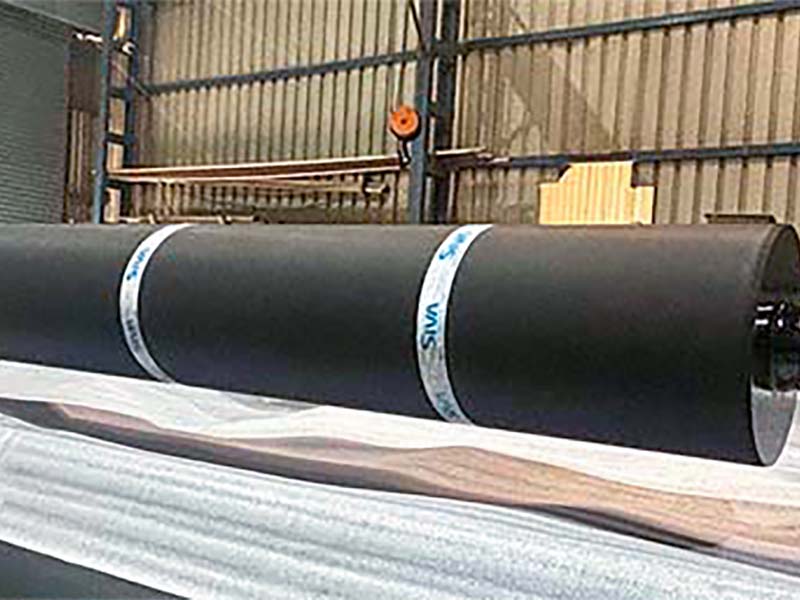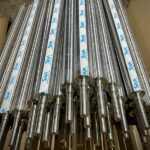Why Rubber Roller Matter in the Manufacturing Industry
In the world of manufacturing, consistency, precision, and durability are essential. Every machine part plays a role in ensuring smooth production, and among these, the Rubber Roller stands out as a key component across industries. Whether in textiles, paper, printing, plastic, steel, or packaging, rubber roller support critical mechanical operations and make a direct impact on product quality, machine longevity, and productivity.
The Backbone of Precision in Production
One of the most important roles of a Rubber Coated Roller is its ability to maintain consistent contact and pressure in fast-moving industrial processes. These rollers are designed to grip, guide, spread, or press materials with high accuracy, ensuring proper alignment and tension. This consistency is vital in industries like textiles and paper where any variation can lead to defects or material waste. The elasticity and customizable hardness of rubber make it an ideal material to absorb minor shocks and adjust to different surfaces without damaging the product.
Vibration Absorption and Noise Reduction
Unlike metal rollers that transmit vibrations and noise, Rubber Covered Roller absorb impact and reduce mechanical noise in machines. In large manufacturing plants, this can significantly improve the working environment and machine efficiency. The damping qualities of rubber help minimize wear on both the roller and the components it interacts with. This is especially useful in delicate material processing such as plastic film or coated fabric production.
Surface Protection for Delicate Materials
Many industries rely on rubber rollers to handle sensitive surfaces. For example, in the printing industry, a Rubber Roller provides a smooth, non-abrasive interface that prevents damage to paper or film. Similarly, in food processing or pharmaceutical packaging, the roller must not contaminate or alter the integrity of the product. Rubber’s non-reactive, flexible, and smooth characteristics make it suitable for such applications. It ensures gentle but firm handling, preventing marks or distortions on the product surface.
Versatility Across Industrial Applications
A major reason Rubber Roller are widely used is their adaptability. From textile calendaring to metal coil coating, and from lamination machines to slitting lines, Industrial Roller coated in rubber are customized in shape, size, hardness, and chemical resistance according to the application. This versatility allows industries to rely on one type of component across multiple functions, which increases operational flexibility and simplifies maintenance.
Chemical and Temperature Resistance
Manufacturing environments often expose machinery to extreme conditions. Whether it’s high temperatures in steel rolling or chemical exposure in paper bleaching, rubber rollers are engineered with specific compounds to withstand such harsh situations. Nitrile, EPDM, silicone, and other synthetic rubbers are commonly used to manufacture Rubber Coated Roller that resist swelling, cracking, or degradation. This ensures long-term performance and reduces downtime for replacements or repairs.
Cost Efficiency and Maintenance Benefits
Rubber roller are not only essential for operations—they are also cost-effective. Compared to all-metal rollers, Rubber Covered Roller are lighter, easier to install, and more affordable to refurbish. Instead of replacing the entire roller assembly, the rubber coating can often be re-ground or re-covered, giving the roller a new life. This makes them an economical solution for large-scale industrial use, especially where high-volume production demands constant roller performance.
Role in Quality Assurance
The performance of a Rubber Roller directly affects the quality of the final product. For example, in laminating or coating applications, a roller must apply uniform pressure and movement to ensure an even layer without bubbles, streaks, or wrinkles. Any imbalance or degradation in the roller’s surface can compromise this, leading to defects. Thus, investing in high-quality rubber rollers is a quality control decision, not just a mechanical one.
Energy Efficiency in Machine Operation
Rubber rollers contribute to energy efficiency by reducing friction and mechanical resistance. Unlike steel rollers that create high wear-and-tear points, Rubber Covered Roller offer a cushioned interface that glides smoothly, requiring less power to operate. Over time, this can lower energy costs and extend the lifespan of drive motors, bearings, and other components, making the whole production process more sustainable.
Customization for Specialized Needs
Modern manufacturing demands components tailored to specific operations. One of the reasons rubber rollers matter so much is because they can be custom-built for unique applications. Whether a company needs a roller with dual-layer hardness, anti-static coating, or specific groove patterns, Industrial Rollers made with rubber offer unmatched flexibility in design. This allows companies to improve machine efficiency, reduce downtime, and adapt to new product lines quickly.
Supporting Automation and Speed
As the manufacturing sector becomes increasingly automated, the reliability of machine parts becomes more important than ever. Rubber Roller play a crucial role in high-speed, automated systems where timing and precision are everything. A malfunctioning roller can halt production lines, delay deliveries, and increase operational costs. High-performance rubber-coated rollers ensure machines operate smoothly at maximum speed without compromising on quality or safety.
Trusted Rubber Roller Manufacturer in India
When it comes to sourcing durable, efficient, and customized Rubber Roller, one name that stands out is Siva Rollers. Based in Ahmedabad, India, Siva Rollers is recognized as a trusted Rubber Roller Manufacturer offering superior quality products for various industries. Their advanced manufacturing process, precision engineering, and commitment to customer satisfaction have made them a preferred partner for clients across India and abroad. If you are looking for a dependable solution for your industrial roller needs, Siva Rollers delivers unmatched value and performance.
Final Thoughts
The significance of rubber rollers in the manufacturing industry cannot be overstated. These components are far more than simple rotating parts—they are essential for quality control, efficiency, safety, and cost savings. Their ability to adapt to various applications, reduce operational noise, absorb vibrations, and perform under challenging conditions makes them a crucial asset in any production setup.
As industries continue to modernize and push the boundaries of speed and precision, the role of Rubber Covered Roller will only grow. Choosing the right roller—and the right manufacturer—can have a direct impact on product quality, machine performance, and operational efficiency. With manufacturers like Siva Rollers leading the way, industries can rely on expertly crafted Rubber Coated Rollers that meet their evolving needs and production challenges.
FAQs
A rubber roller is used for gripping, pressing, guiding, or coating materials in machines. It ensures precision, quality, and smooth operation.
Rubber coated roller offer better grip, absorb vibrations, reduce noise, and prevent damage to delicate surfaces—unlike hard metal rollers.
Industries like textiles, printing, paper, packaging, steel, plastics, and food processing widely use rubber covered rollers for various applications.
Yes, rubber roller can be made with specific rubber compounds to resist heat, chemicals, oils, and harsh conditions in industrial environments.
Siva Rollers is a leading rubber roller manufacturer in Ahmedabad, offering high-quality, customized rollers for a wide range of industrial needs.



